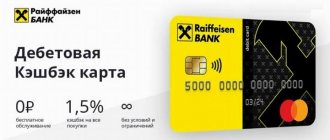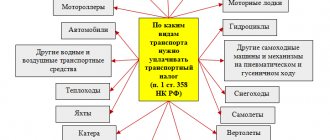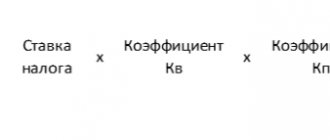Transport tax rates in the Moscow region
For a year
| Name of taxable object | Rate (RUB) for 2022 |
| Passenger cars | |
| up to 100 hp (up to 73.55 kW) inclusive | 10 |
| over 100 hp up to 150 hp (over 73.55 kW to 110.33 kW) inclusive | 34 |
| over 150 hp up to 200 hp (over 110.33 kW to 147.1 kW) inclusive | 49 |
| over 200 hp up to 250 hp (over 147.1 kW to 183.9 kW) inclusive | 75 |
| over 250 hp (over 183.9 kW) | 150 |
| Motorcycles and scooters | |
| up to 20 hp (up to 14.7 kW) inclusive | 9 |
| over 20 hp up to 35 hp (over 14.7 kW to 25.74 kW) inclusive | 16 |
| over 35 hp (over 25.74 kW) | 50 |
| Buses with the number of years that have passed since the year of manufacture, up to 5 years inclusive | |
| up to 200 hp (up to 147.1 kW) inclusive | 27 |
| over 200 hp (over 147.1 kW) | 56 |
| Buses with the number of years that have passed since the year of manufacture exceeding 5 years | |
| up to 200 hp (up to 147.1 kW) inclusive | 50 |
| over 200 hp (over 147.1 kW) | 100 |
| Trucks with the number of years that have passed since the year of manufacture, up to 5 years inclusive | |
| up to 100 hp (up to 73.55 kW) inclusive | 20 |
| over 100 hp up to 150 hp (over 73.55 kW to 110.33 kW) inclusive | 25 |
| over 150 hp up to 200 hp (over 110.33 kW to 147.1 kW) inclusive | 33 |
| over 200 hp up to 250 hp (over 147.1 kW to 183.9 kW) inclusive | 45 |
| over 250 hp (over 183.9 kW) | 58 |
| Trucks with a number of years that have passed since the year of manufacture exceeding 5 years | |
| up to 100 hp (up to 73.55 kW) inclusive | 25 |
| over 100 hp up to 150 hp (over 73.55 kW to 110.33 kW) inclusive | 40 |
| over 150 hp up to 200 hp (over 110.33 kW to 147.1 kW) inclusive | 50 |
| over 200 hp up to 250 hp (over 147.1 kW to 183.9 kW) inclusive | 65 |
| over 250 hp (over 183.9 kW) | 85 |
| Other self-propelled vehicles, pneumatic and tracked machines and mechanisms | 25 |
| Snowmobiles, motor sleighs | |
| up to 50 hp (up to 36.77 kW) inclusive | 25 |
| over 50 hp (over 36.77 kW) | 50 |
| Boats, motor boats and other water vehicles | |
| up to 100 hp (up to 73.55 kW) inclusive | 100 |
| over 100 hp (over 73.55 kW) | 200 |
| Yachts and other motor-sailing vessels | |
| up to 100 hp (up to 73.55 kW) inclusive | 200 |
| over 100 hp (over 73.55 kW) | 400 |
| Jet skis | |
| up to 100 hp (up to 73.55 kW) inclusive | 100 |
| over 100 hp (over 73.55 kW) | 200 |
| Non-self-propelled (towed) ships for which gross tonnage is determined (from each registered ton of gross tonnage) | 200 |
| Airplanes, helicopters and other aircraft with engines (per horsepower) | 250 |
| Airplanes with jet engines (per kilogram of thrust) | 200 |
| Other water and air vehicles without engines (per vehicle unit) | 2000 |
FILES
Note to the table: the values are given in the Moscow region for 2016, 2022, 2022, 2022, 2022, 2022, 2022. To select rates for a specific year, use the selector. These rates are applied in the cities: Aprelevka, Balashikha, Bronnitsy, Vidnoye, Volokolamsk, Voskresensk, Golitsyno, Dzerzhinsky, Dmitrov, Dolgoprudny, Domodedovo, Dubna, Yegoryevsk, Zheleznodorozhny, Zhukovsky, Ivanteevka, Istra, Kashira, Klimovsk, Klin, Kolomna, Korolev, Kotelniki, Krasnoarmeysk, Krasnogorsk, Krasnozavodsk, Lobnya, Losino-Petrovsky, Lukhovitsy, Lytkarino, Lyubertsy, Mozhaisk, Mytishchi, Naro-Fominsk, Noginsk, Odintsovo, Lakes, Orekhovo-Zuevo, Pavlovsky Posad, Podolsk, Pushkino, Pushchino, Ramenskoye, Reutov , Sergiev Posad, Serpukhov, Solnechnogorsk, Stupino, Fryazino, Khimki, Chernogolovka, Chekhov, Shatura, Shcherbinka, Shchelkovo, Elektrogorsk, Elektrostal, Yakhroma and other settlements of the Moscow region.
In the Moscow region there are fewer registered transport tax payers than in Moscow. However, more than in other regions of the country - 2 million 150 thousand citizens and legal entities. All of them make payments to the budget, guided by the requirements of Law No. 33 of July 9, 2008.
Payment procedure for legal entities
Unlike other constituent entities of the Russian Federation, in Moscow organizations are not required to make advance payments. They can remit the entire amount of fees once a year. The main thing is to do this before February 5 of the year following the reporting period. All excess amounts paid will be used to pay the fee for the next reporting period or, at the request of the person, transferred to the company account.
In the Moscow region, legal entities must make advance payments before the last day of the month following the reporting month. The remaining contribution amount must be transferred by March 28 of the year following the reporting year.
Tax calculation and payment deadlines for organizations
In the Moscow region, as in the vast majority of regions, taxpayers from legal entities make advance payments based on quarterly results. Tax for the entire year is paid in full at the end of the year. The payment deadline is March 28. When calculating, the amount is rounded to the nearest ruble according to mathematical rules: if there are more than 50 kopecks in the amount, they are paid as one ruble, less - kopecks are not taken into account.
Deadline for payment of transport tax for legal entities in 2022:
- for 2022 - no later than March 1, 2022
- for the 1st quarter of 2022 - no later than May 2, 2022
- for the 2nd quarter of 2022 (6 months) - no later than August 1, 2022
- for the 3rd quarter of 2022 (9 months) - no later than October 31, 2022
- for the 4th quarter and the entire year 2022 - no later than March 1, 2023
How to calculate an advance payment for transport tax
Advance payments for transport tax are calculated based on the results of the reporting periods. The reporting periods are the I, II and III quarters (clause 2 of Article 360 of the Tax Code of the Russian Federation).
The payment amount is determined as ¼ of the product of the tax base and the tax rate (clause 2.1 of Article 362 of the Tax Code of the Russian Federation). This takes into account the so-called ownership coefficient and the increasing coefficient for expensive cars.
In general, the calculation formula looks like this:
AP = ¼ × NB × NS × Kv × Kp,
where NB is the tax base (for a car this is the engine power in horsepower), NS is the tax rate, Kv is the ownership coefficient, Kp is the increasing coefficient.
The tax rate is also set by the constituent entity of the Russian Federation, and it can not only vary significantly by region, but also change from year to year.
We explained here what the transport tax rate depends on.
The ownership ratio is defined as the ratio of the number of full months during which the vehicle was registered to the taxpayer to the number of calendar months in the tax (reporting) period. The month in which the right to own a vehicle arose before the 15th or was lost after the 15th is considered complete (clause 3 of Article 362 of the Tax Code of the Russian Federation).
The size of the increasing coefficient depends on the average cost and age of the car. Specific values of the coefficient are fixed in clause 2 of Art. 362 Tax Code of the Russian Federation.
From 2022, for cars costing from 3 million to 5 million rubles. no older than 3 years, a single coefficient of 1.1 is applied ( read more in this publication ).
The list of expensive cars must be published annually by the Ministry of Industry and Trade.
At the end of the reporting periods, no reports are submitted.
Find out about liability for non-payment of transport tax and advance payments on it in ConsultantPlus. If you do not have access to the K+ system, get a trial online access for free.
Rules and deadlines for paying taxes for individuals
Citizens also do not make advance payments, but they do not need to make payments themselves. All the necessary information for paying taxes for the past year is received by residents of the region in the form of notifications from the territorial divisions of the Federal Tax Service. Letters are sent to the place of registration of the individual. If the place of residence has been changed, and due to circumstances the tax authority has not been notified about this, you can use the taxpayer’s Personal Account on the tax service website.
Individuals are required to pay invoices no later than December 1 of the same year in which the notification is received. Failure to pay taxes on time will result in a fine.
Deadline for payment of transport tax for individuals in 2022:
- for 2022 - no later than December 1, 2022
- for 2022 - no later than December 1, 2023
Please take into account: in accordance with paragraph 7 of Art. 6.1. Tax Code of the Russian Federation, if the last day of the period falls on a weekend, then the day of expiration of the period is considered to be the next working day following it.
Transport tax 2022: Moscow and region
The collection in question is a regional one, the funds from it go to the local budget. Therefore, the authorities of the constituent entities of the Russian Federation have the right to independently set its rate, as well as provide for various benefits. However, paragraph 2 of Article 361 of the Tax Code of the Russian Federation limits the increase and decrease in the size of the transport fee. According to this norm, the authorities of the constituent entities of the Russian Federation cannot reduce or increase the rate by more than 10 times. Local authorities may set differentiated rates. In other words, the amount may depend on the power of the vehicle and the year of its manufacture. If regional authorities have not adopted a legislative act regulating transport tax, taxation is carried out in accordance with the figures and rules of the Tax Code of the Russian Federation.
The Moscow authorities have taken care of the adoption of their tax norms, therefore the payment of the fee is made in accordance with the Moscow Law No. 33 dated 07/09/2008. The Law of the Moscow Region dated November 16, 2002 No. 129/2002-OZ is in force in the Moscow Region.
Benefits for individuals
A number of residents of the region may qualify for transport tax benefits:
- heroes of the USSR, Russian Federation, as well as full holders of the Order of Glory;
- veterans and disabled combat veterans, incl. WWII;
- disabled people (disability group 1, 2);
- citizens who were captured by the Nazis as minors during WWII;
- victims of radiation as a result of the Chernobyl accident;
- guardian of a disabled child, one of the parents in a large family;
- victims of radiation during the accident at Mayak, as well as those exposed to radiation during testing at the Semipalatinsk test site;
- citizens who were at risk during nuclear weapons testing, as well as those who suffered from radiation sickness during such tests;
- guardian of an incapacitated citizen;
- owners of vehicles with engines less than 70 hp.
FILESOpen table of transport tax benefits in the Moscow region
Tax rates and their calculation
The tax amount must be calculated depending on which category the vehicle belongs to and the power of its engine. Transport tax is a regional tax, which is why each subject of the Russian Federation has its own tax rates and benefits provided for them.
To correctly calculate the required transport tax, multiply the tax rate by the engine power:
Tax amount (rub.) = (cash rate) x (L.S.)
Transport tax in 2022: changes in Moscow Region and Moscow
In 2022, there were no changes in the size and structure of tax rates for transport in the capital and region. The only innovations introduced this year are a new form for filling out the declaration . Another innovation that affects exclusively legal entities is their receipt of notifications about the amount of the fee from the Federal Tax Service.
Previously, companies owning vehicles independently calculated the amount of contributions due to the local budget. Starting from the coming year, the Federal Tax Service will do this for them, sending a receipt with the amount due for payment.
Features of transport tax for pensioners in Moscow
Transport tax is a regional tax, so the main nuances of its collection are established by local authorities. By decree of the Moscow government, certain categories of Muscovites. However, these do not include people of retirement age. Pensioners living in the capital and Moscow region will have to pay the tax fee in full, like other vehicle owners.
An exception is the situation when the pensioner is a disabled person of groups I or II , a parent of many children, a WWII veteran, a hero of the Russian Federation or the USSR, a full holder of the Order of Glory. In these situations, the transport tax for pensioners in Moscow will be reduced or completely abolished .









